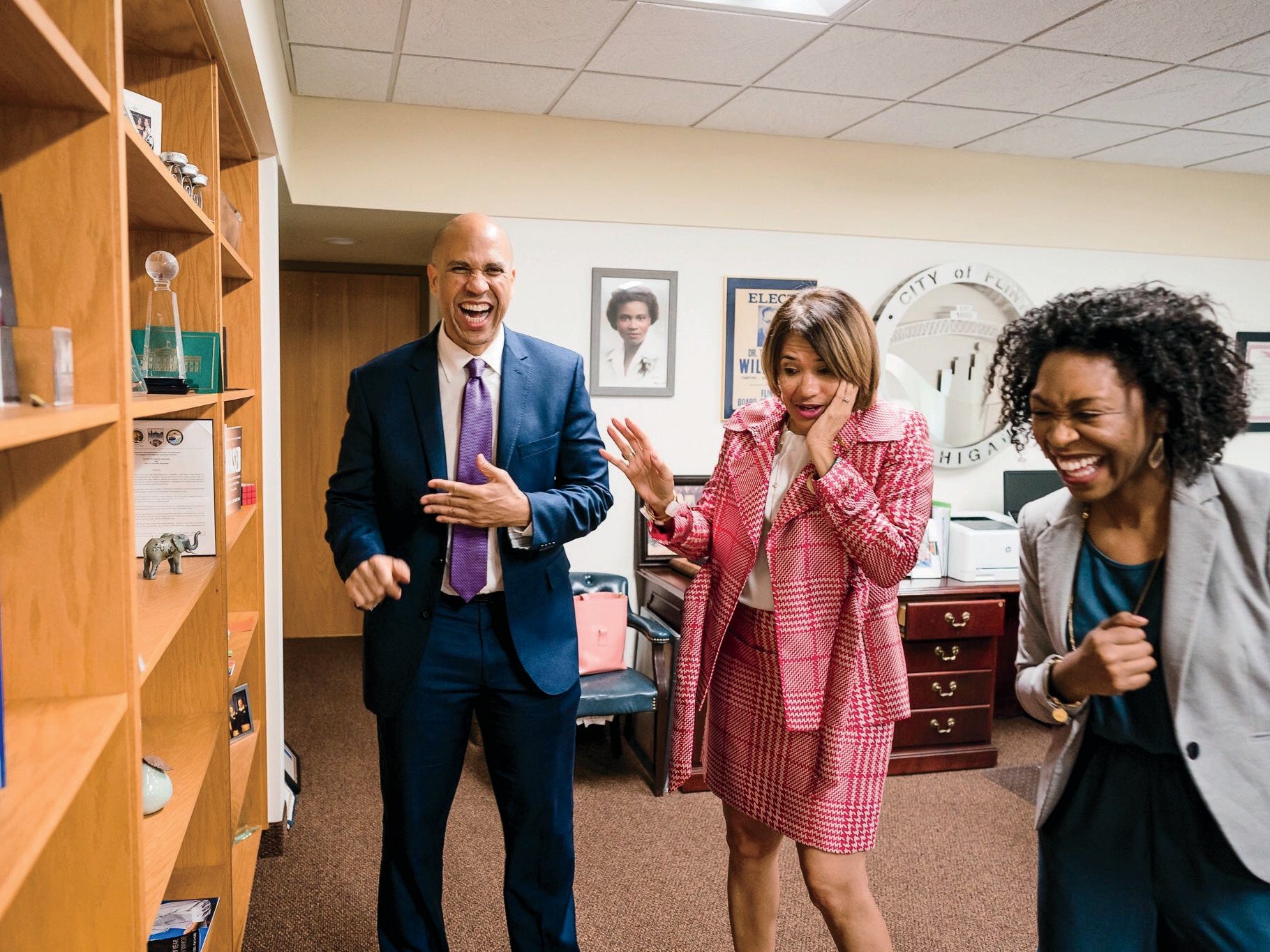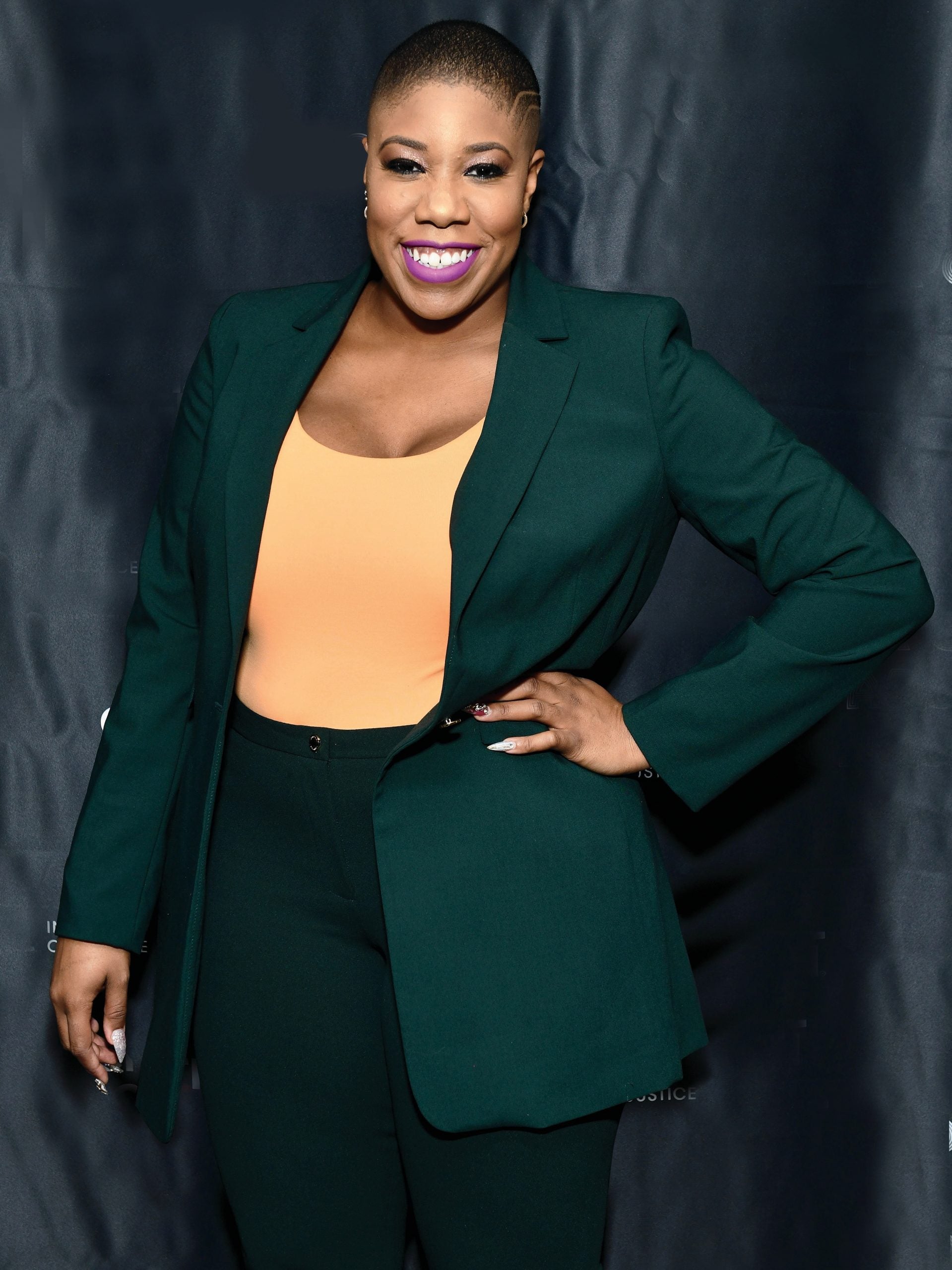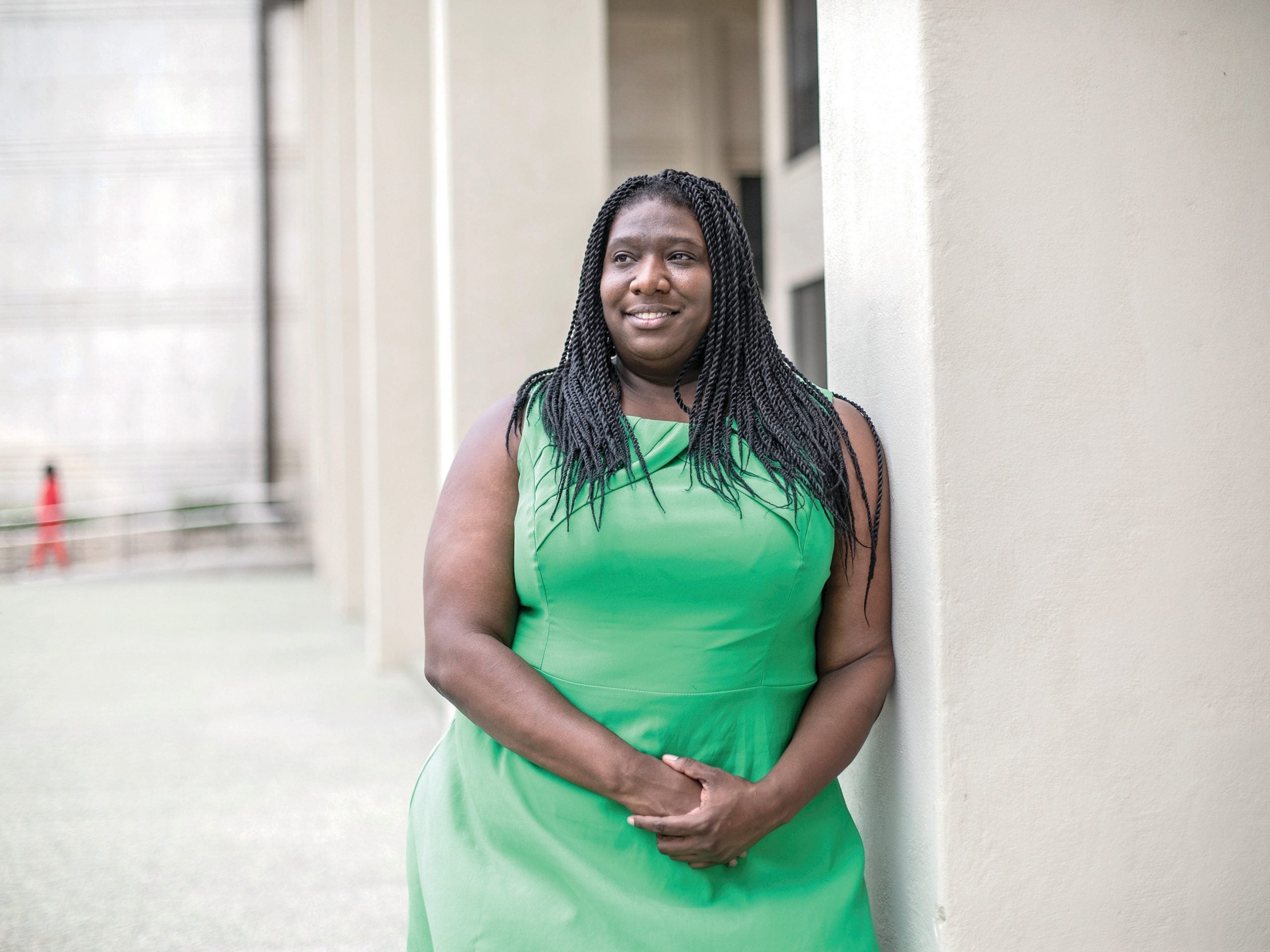It’s 8 a.m. on a Saturday, but sleep can wait: Nina Turner has a flight to catch. As the lead national co-chair for Bernie 2020—Vermont senator Bernie Sanders’s presidential campaign—traveling across the country is all in a day’s work. “We’ll be on the road for about nine days: the Carolinas, California and Iowa,” says Turner, the highest-ranking Black woman on the team. “I’ll be going to political events, managing staff, doing debate prep and lending my skills wherever they are needed.”
Despite a grueling schedule that means time away from home and family, the wife and mother is committed to supporting her candidate. Moreover, she feels duty bound to uphold America’s democratic process. “Everything we love is on the line,” the former Ohio state senator says of the November elections. “I’m on a justice journey.”
In the 2020 election cycle, more women than ever before have assumed leadership positions, many of them Black. We have been tapped for some of the most critical roles, from campaign manager to campaign chairs to political directors to senior advisers and more. In fact, among the crop of hopefuls in the Democratic primary field, many of the candidates have entrusted us with high-level jobs, both out front and behind the scenes.

Senator Sanders, former Vice-President Joe Biden, Massachusetts senator Elizabeth Warren and former South Bend, Indiana, mayor Pete Buttigieg have all hired Black women whose responsibilities are significant. According to an expert, the number of Black women involved in presidential campaigns this go-round is unprecedented.
“White women have been organizing around candidates for decades,” notes Andra Gillespie, Ph.D., associate professor of political science at Emory University. “What has happened in the past 16 years is greater intentionality on the part of Black people who are embedded in political circles. This has created new networks and opportunities for Black women.”
While groups such as The Collective Political Action Committee, which created The Black Campaign School, and the women-focused EMILY’s List are helping to prepare a more diverse cadre of candidates and political operatives, experts say campaign leaders are groomed in a variety of ways.
“Folks may have degrees in politics or government, and frequently they’re also lawyers,” notes David C. Barker, Ph.D., director of the Center for Congressional and Presidential Studies at American University. “Many begin working on campaigns as students or interns and then work their way up. In this way networks are built. Being on a campaign is like being part of a community.”
It also helps that both Democrats and Republicans have become more attuned to the power of Black women voters and understand that we need to be informing their campaigns at top levels.
THE KAMALA FACTOR
When U.S. senator Kamala Harris became just the third Black woman to compete for a major-party presidential nomination, the former California attorney general enlisted her younger sister, Maya Harris, a civil rights lawyer, to serve as her campaign chair. Maya had previously been one of three senior policy advisers on Hillary Clinton’s 2016 campaign.
After kicking off her bid in Oakland, Senator Harris developed nationwide momentum and support before the campaign, citing financial woes, suspended its operations in December. “I believe our campaign showed every child in America, regardless of their color or gender, that there are no limits to who can lead and hold positions of power in our country,” Harris said at the time.
“In that way this campaign has been so much bigger than me.” Although the senator exited the field before the first primary votes were cast, some believe that her candidacy inspired voters and insiders alike to reimagine what is possible for the presidency. As she’d told audiences on the trail, “I have faith in the American people to know that we will never be burdened by the assumptions of who can do what based on who historically has done it.”
Harris is only the latest in generations of Black women who have shattered political barriers and helped carve out a path for younger talent to pick up the baton. Shirley Chisholm, using the slogan Unbought and Unbossed, became the first African-American candidate to campaign for the 1972 Democratic Party presidential nomination. She was later followed by Carol Moseley Braun, who was the first Black woman elected to the U.S. Senate and served from 1993 to 1999.
She made a run for the Democratic nomination for president in 2000 and 2004. Yet it was Donna Brazile who became the first African-American woman to head a major-party presidential campaign. For many Americans, seeing a confident Black woman standing alongside former Vice-President Al Gore as he sought the presidency in 2000 was a revelation.

Years later Margaret “Maggie” Williams managed Hillary Rodham Clinton’s first presidential bid. Along the way Brazile, Yolanda Caraway, Leah Daughtry and Minyon Moore— who’ve dubbed themselves The Colored Girls—have ent their talents to the presidential campaigns of Barack Obama, Bill Clinton, the Reverend Jesse Jackson, former Vice-President Walter Mondale and Governor Michael Dukakis.
“In an election cycle where Democratic women made historic gains across all levels of office, Black women were key players in that success,” observes Glynda C. Carr, a cofounder with Kimberly Peeler-Allen of Higher Heights for America, a national organization that works to harness the political power of Black women from the voting booth to elected office. “The 2020 election will provide another opportunity for Black women to close the gap between their representation in the population and their power.”
A SEAT AT THE TABLE
Ahead of this pivotal election, we caught up with some of the Black women wielding influence at senior levels on presidential campaigns. While some of the candidates have since left the race—including New Jersey senator Cory Booker and Texas politician Julián Castro—these Black women all express pride in claiming a seat at the table.
In Castro’s camp, Maya Rupert was just the third Black woman to oversee a major-party presidential campaign, while Tamia Booker served as national political director and Christina Coleman worked as the millennial and influencer engagement director for Cory Booker’s team. “I’m inspired by how he leads with empathy and humanity,” Coleman, a former ESSENCE editor, says.
“He’s really about the people.” On Elizabeth Warren’s team, Rebecca Pearcey is the national political director and Tracey Lewis is senior adviser for states and organizing. About eight years ago, Lewis was invited to Warren’s home to discuss the candidate’s then budding endeavor to win a seat in the U.S. Senate. “We talked about her lifelong efforts to understand and fight for economic power and fairness for families,” Lewis recalls. “And we talked about the type of campaign she wanted to build—a grassroots one that was inclusive, diverse and committed to empowering women and people of color across the organization. We also talked about social justice and our mutual hope to be active participants in our democracy.”

After that meeting Lewis became the deputy campaign manager for Warren’s winning Senate bid. Today she’s one of multiple Black women in leadership roles as the Massachusetts lawmaker runs to become president. Lewis, the owner of TL Strategies, LLC, a grassroots consulting firm, has 20 years of electoral, grassroots advocacy and project management know-how. She handled special projects at two national Democratic conventions and served as Hillary Clinton’s national primary states director.
“I help oversee the broader programming in the states and organizing programs across the nomination map,” explains Lewis, who believes Black women should vote for Warren in 2020 because the senator “understands big structural change is necessary in America.” Warren has offered multiple plans, which include creating safe and affordable housing, tackling redlining, addressing the maternal mortality crisis and confronting discrimination and all forms of injustice.
But what further defines the candidate, notes Lewis, is her compassion. “While I was my dad’s caregiver during the last year of his life, I faced the heartbreaking task of trying to navigate a broken health care system,” she remembers. “Elizabeth reached out to me with kindness, empathy and support. My dad was a former chef who died at the age of 68, like many Black men, leaving us too soon. He had volunteered for Elizabeth in 2012 and hoped he would live to see a change in the White House.”
Symone Sanders, senior adviser for Biden 2020, is all about that change. She says the first time she sat down with the former vice-president, the conversation unfolded as if they were old friends. “We were supposed to meet for 30 minutes and it turned into two hours,” she says. “That’s the way he is, very personable and warm, and he genuinely listens.”
Sanders is a seasoned political strategist who worked on the Bernie Sanders campaign in the 2016 cycle. While she doesn’t disparage her former boss, she feels that Biden is the best person to move the United States forward this time around. “He’s experienced and will be ready to do the job from day one,” says the former CNN political commentator.
She points out that the Biden campaign has released multiple plans that range from investing in the middle class to backing collective bargaining for workers to ensuring that military families have what they need. Also covered are education, health care, immigration reform, strategies to end gun violence and violence against women, ways to secure older and rural Americans, and student debt relief.
Sanders, who formerly chaired the Coalition for Juvenile Justice’s Emerging Leaders Committee, says Biden shares her passion for raising the profile of young voices in the fight for juvenile justice reform: “We want to bring new perspectives to policy conversations.”
Sanders may be the highest-ranking Black woman on the Biden roster, but it also includes National Trips Director Ashley Williams; National Political Director Erin Wilson; Sherice Perry, who is Jill Biden’s communications director; and Director of Human Resources Dalmyra Caesar. Former U.S. Senator Carol Moseley Braun is a campaign surrogate.
The Biden team is proud of its diversity and top talent, says Kamau Marshall, its director of strategic communications. “The African-American women on this campaign play a critical role in our success,” he adds. “Biden made sure his campaign reflected the diversity of the country he is running to lead. What you see in his staff is what you see in his diverse coalition of support from voters across the United States.”
COMMUNITY BUILDING
Nina Smith, the traveling press secretary for Pete Buttigieg, understands that the way a candidate communicates is at the heart of reaching voters. She coordinates on-the-ground interviews, candidate briefings and more. Before joining the Pete for America campaign, Smith was managing partner at Megaphone Strategies, a social justice public relations firm that has worked with Stacey Abrams, Deb Haaland and organizers with Black Lives Matter.
“Roughly 40 percent of our campaign staff are people of color and 50 percent are women,” she says of Buttigieg’s camp. “And 28 percent of our staff are members of the LGBTQ+ community.” Besides pushing bread-and-butter issues such as paid family leave and raising the minimum wage, Smith is proud of Buttigieg’s agenda for our community.
The Douglass Plan for Black America was developed in tandem with adviser Portia Allen Kyle, a Black civil rights attorney; activists; and community leaders. The 18-page proposal focuses on five pillars: homeownership, entrepreneurship, education, health and justice. Voter suppression, environmental justice and racial disparities in medical treatment are tackled.

“He has made addressing systemic racism a priority,” says Smith. “I hope Black women will consider voting for him. He is the candidate ready to bring our country together.” Elsewhere on the trail, René Spellman, deputy campaigning for Medicare for All, free college, The Green New Deal and support for historically Black colleges and universities.
An alumna of Bernie 2016, Spellman served as the campaign’s national director of traveling press and media logistics during the primary season before becoming national director of surrogates during the convention. Spellman was previously at Creative Artists Agency, where she harnessed Hollywood’s star power for philanthropy and advocacy.
This time around she looks up to other Black women in senior roles in Bernie’s 2020 campaign, including National Press Secretary Briahna Joy Gray, Chief of People and State Operations Rikimah Glymph, South Carolina State Director Jessica Bright and, of course, former Ohio state senator and National Cochair Nina Turner.
“Our community has had enough of politicians who say one thing in public, but then go off to cut compromise deals with the special interests behind closed doors— all while the people we know and love are suffering,” says Turner. “We can do so much better as a country, and under a Sanders administration, we will prioritize the issues that matter to Black America.”
